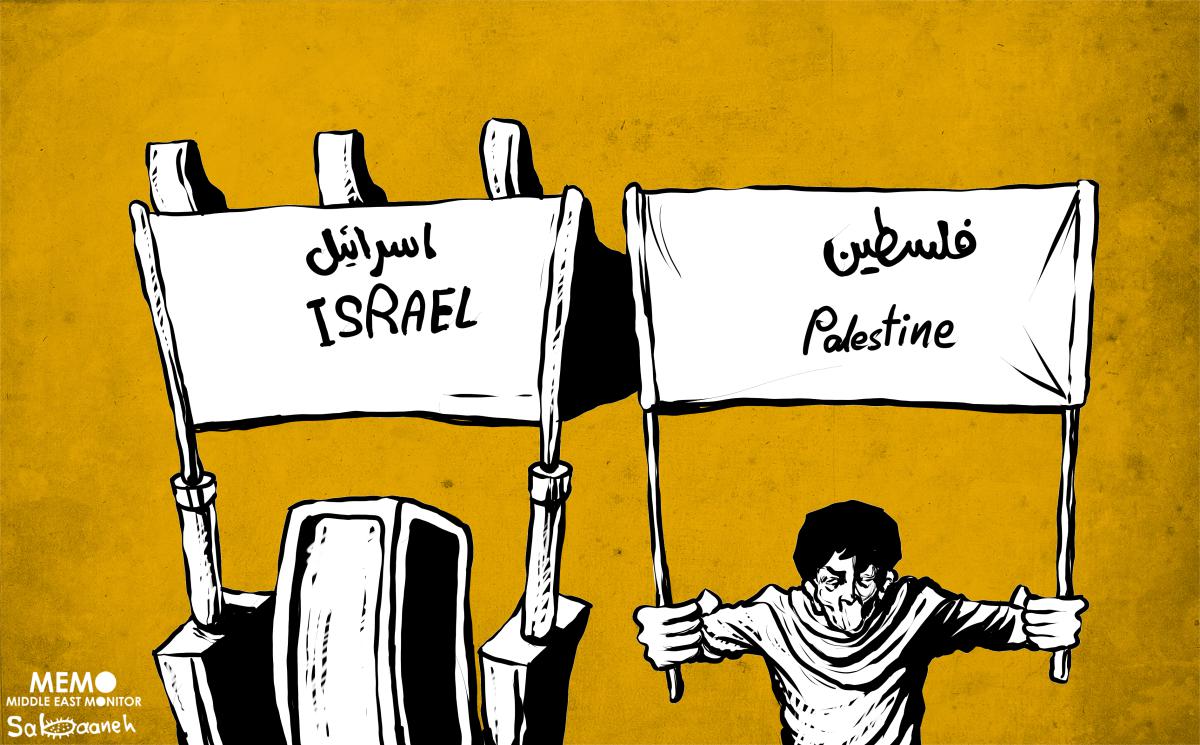With no meaningful international plan, Khan Al-Ahmar needs a popular uprising to save it

The Palestinian Bedouin residents of Khan Al-Ahmar wake up every morning relieved that the Israeli occupation’s bulldozers did not arrive overnight to destroy their homes and their children’s school. They remain fearful, though, that it is only a matter of time before their village is destroyed and they are expelled from the land they have lived on for over 40 years
One can only imagine the horror that the residents, especially the children, experience because of this psychological terrorism to which Israel is subjecting them.
UNICEF expressed its alarm recently that that “the school in Khan Al Ahmar in the State of Palestine could be destroyed in the coming days or even hours.” The UN body added that, “The 167 children from that town and neighbouring village who are learning, dreaming and playing there have a right to access safe education wherever their communities and families are living, just like all the other children in the world.” UNICEF asked the Israeli authorities for “the interests of children [to] be a primary consideration in their decision making.”
Any assumption that Israel cares about the education or welfare of Palestinian children is simply not supported by the evidence of its daily conduct. Children are routinely abducted in the night, bundled into Israeli army vehicles, interrogated without parents or legal advisers present, tried before military courts in a language most don’t understand, and imprisoned for long periods. Furthermore, Israeli snipers have no compunction about pointing their rifles at children at the Gaza fence and killing them. In August, Defence for Children International reported that Israel had killed 37 Palestinian children since the start of 2018. The number continues to rise; the latest victim was 12-year-old Faris Al-Sirsawi.
The village of Nabi Saleh found its way onto the international stage, becoming a must-visit part of the itinerary of not only international human rights activists but also Western politicians, not least because the Tamimis — young Ahed Tamimi in particular — rose to prominence there with their resistance to the Israeli occupation. That resistance culminated with the now famous slap of an Israeli soldier by Ahed, for which she paid with 8 months in jail.
Khan Al-Ahmar has captured the imagination of the international community not only because its demolition is simply the wrong thing to do on a humanitarian level, but also because of its actual location, which Western politicians understand could finally lay to rest any remaining prospect of a two-state solution. The argument is that if the village is destroyed and Israel proceeds to expand the illegal settlements in the “E1 corridor”, Jerusalem will be cut off from its West Bank hinterland completely and the contiguity needed for a Palestinian state would be lost.
The village has become a battleground between the international community and the Israeli authorities, who are now armed with a decision by the Supreme Court that the village can be demolished and could proceed with their plans at any moment. The Israelis argue that the villagers built their homes without permits. The residents point out that Israel refuses to grant permits to Palestinians to build on their own, illegally-occupied land, while colonies continue to be built for Jews within sight of their village. Only Israel regards the land on which the Bedouins live as “state land” rather than illegally-occupied territory, as the whole of the international community sees it. If the land is indeed state land, then it can only belong to the state of Palestine.
A number of politicians have “expressed concern” at the demolition plan, with some being moved to warn Israel that forced transfer of an occupied people could “amount to a war crime”. One of the most vocal has been Britain’s Minster for the Middle East, Alistair Burt, who has visited the village on a number of occasions. While warning Israel that it could be committing a “war crime”, Burt has not made the demolition and forced transfer of the local population a red line that, if crossed by Israel, would bring forth consequences for Britain’s relations with the Zionist state.
There were hopes that, during her recent visit, German Chancellor Angela Merkel would not only raise the issue of the village with her host Benjamin Netanyahu but would also go further. Reports initially suggested that Merkel would cancel her visit if the village was demolished before her arrival. However, once there, her reported response to the issue was typically weak of Western politicians. “This is an Israeli decision,” she said at a morning event at the Israel Museum in Jerusalem, during which the University of Haifa conferred upon her an honorary doctorate. You’re wrong, Frau Merkel, it is not an Israeli decision. It is a failure of the international community to act to stop Israeli crimes that will lead to the village’s demolition.
The predicament of the community of Khan Al-Ahmar can be traced back to the Oslo Accords, signed in 1993. The 25th anniversary of the Accords was marked with a key conference organised recently by Middle East Monitor. Oslo failed to deal with the core issues that must be resolved if peace is to be achieved between Palestinians and Israelis. One of these is the issue of settlements and the illegal occupation. The lack of reference to international law in the Accords is a fundamental flaw therein. However, it is the lack of political will by the international community to pressure Israel to fulfil its undertakings under the agreement which continues to give Israel free rein to do whatever it wants.
Israel will no doubt demolish Khan Al-Ahmar at a time of its choosing. The international community will express concern, disappointment and possibly condemnation of this. The EU might even ask Israel to compensate it for funds donated towards small projects in the village. However, no meaningful action will be taken against the state. At the end of the day, Israel will just move on to carry out another illegal act as it seeks to complete the Zionist occupation of the whole of historic Palestine, from the River Jordan to the Mediterranean Sea.
With no meaningful plan by the international community in place to protect the village, the only action that will end the uncertainty for the residents of Khan Al-Ahmar will be a popular uprising that sees thousands of Palestinians march there, determined to protect it for as many days or months as it will take either for Israel to abandon its plans or for the international community to realise that this tiny village will not only be a symbol of peaceful resistance, but will also raise the cost of the occupation for Israel to a point where it begins to come to its senses. That could see the Great March of Return protests at the Gaza fence, now in their eighth month, finally arrive in the West Bank. If Trump and his Zionist advisers can disrupt the status quo in favour of Israel, the Palestinian people can disrupt it in favour of their cause.

Source: Middle East Monitor

WRITE YOUR COMMENT